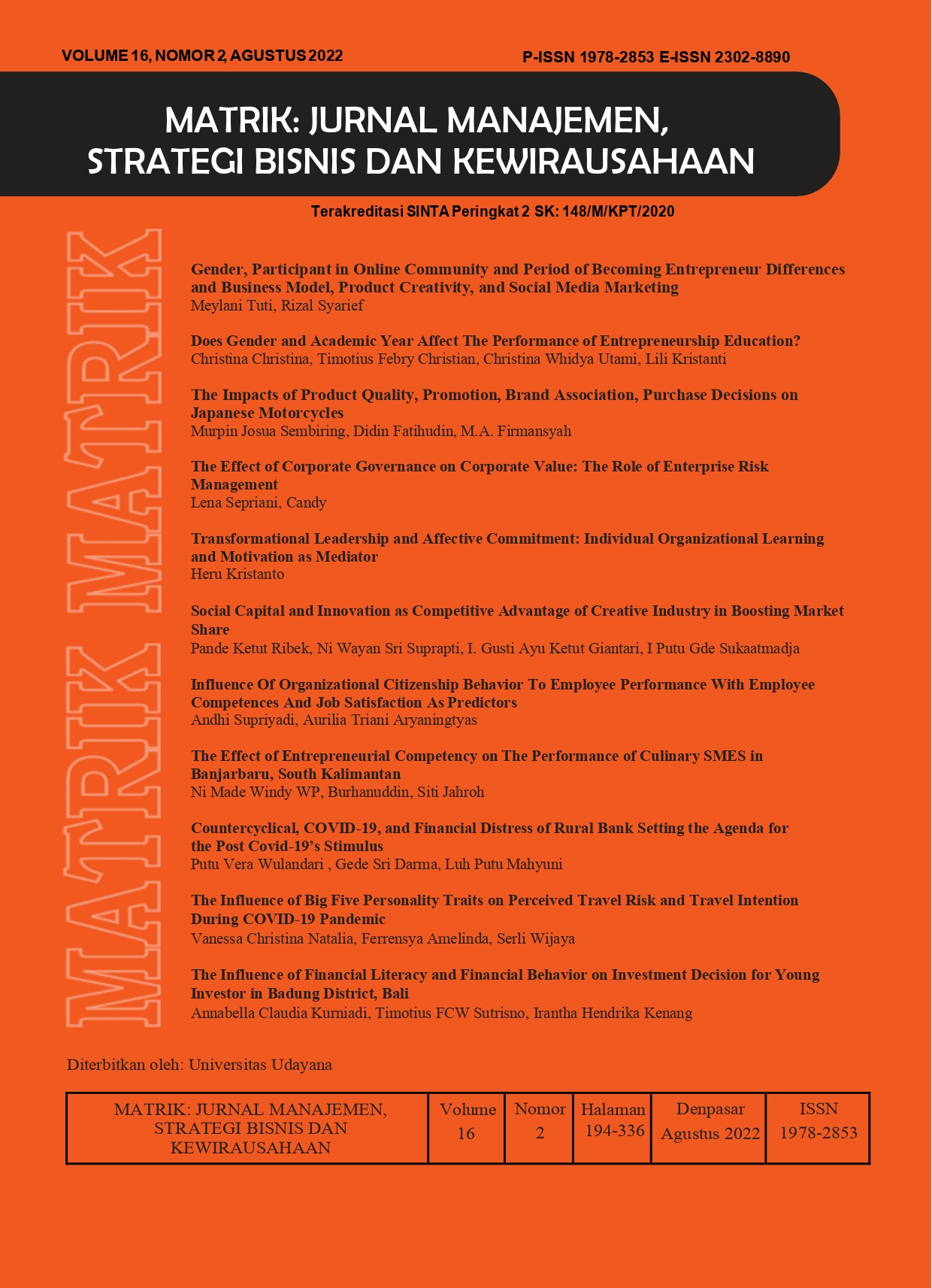Transformational Leadership and Affective Commitment: Individual Organizational Learning and Motivation as Mediator
Abstract
Penelitian ini bertujuan untuk menguji pengaruh kepemimpinan transformasional pada komitmen afektif melalui pemediasi pembelajaran organisasional level individu dan motivasi. Penelitian dilakukan di salah satu rumah sakit di bawah Yakkum di Kota Yogyakarta. Hasil penelitian menunjukkan bahwa terdapat pengaruh langsung kepemimpinan transformasional pada komitmen afektif. Hasil penelitian juga menunjukkan bahwa pembelajaran organisasional level individu dan motivasi berperan sebagai pemediasi sebagian.
Downloads
References
learning in the ministry of communication and information technology in Jordan. International Journal of Business and Social Science, 9(1), 118–129
Allen, T.D., Barnard, S., Rush, M.C., & Russell, J. (2000). Ratings of organizational citizenship behavior: Does the source make a difference?. Human Resource Management Review, 10(1): 97–114.
Allen, N. J., & Meyer, J. P. (1990). The measurement and antecedents of affective,
continuance and normative commitment to the organization. Journal of Occupational Psychology, 63(1), 1–18. https://doi.org/10.1111/j.2044-8325.1990.tb00506.x
Alsabbagh, M., & Al Khalil, A. H. (2017). The impact of organizational culture on
organizational learning: An empirical study on the education sector in Damascus city. International Journal of Academic Research in Business and Social Sciences, 7(4): 579-600.
Amitay, M., Popper, M., & Lipshitz, R. (2005). Leadership styles and organizational learning
in community clinics. The Learning Organization 12(1): 57-70.
https://doi.org/10.1108/09696470510574269
Andressen, P., Konradt, U., & Neck, C. P. (2012). The relation between self-leadership and
transformational leadership: Competing models and the moderating role of virtuality. Journal of Leadership & Organizational Studies, 19(1): 68-82.
Avolio, B. J., Zhu, W., Koh, W., & Bhatia, P. (2004). Transformational leadership and
organizational commitment: Mediating role of psychological empowerment and moderating role of structural distance. Journal of Organizational Behavior, 25(8): 951–968. https://doi.org/10.1002/job.283
Baron, R. & Kenny, D.A. (1986). The moderator-mediator distinction in social psychological
research: conceptual, strategic, and statistical considerations. Journal of Personality and Social Psychology, 51(6): 1173-1182
Barroso Castro, C., Villegas Periñan, M. M., & Casillas Bueno, J. C. (2008).
Transformational leadership and followers’ attitudes: the mediating role of psychological empowerment. The International Journal of Human Resource Management, 19(10), 1842–1863.
Bass, B.M. (1985). Leadership and Performance beyond Expectations. Publisher: Free Press, New York.
Bass, B.M. (1995) Theory of Transformational Leadership Redux. The Leadership
Quarterly, 6, 463-478. https://doi.org/10.1016/1048-9843(95)90021-7
Bass, B.M. & Riggio, R.E. (2006). Transformational Leadership. Publisher: Lawrence Erlbaum Associates, New York.
Bhatnagar, J. (2007). Predictors of organizational commitment in India: Strategic HR roles,
psychological empowerment, and organizational learning capability. International Journal of Human Resource Management, 18(10): 1782-1811.
Bono, J. E., & Judge, T. A. (2003). Core Self-Evaluations: A review of the trait and its role in
job satisfaction and job performance. European Journal of Personality, 17, 5–18.
Brand, B. L., Myrick, A. C., Loewenstein, R. J., Classen, C. C., Lanius, R., McNary, S. W.,
Pain, C., & Putnam, F. W. (2011). A Survey of Practices and Recommended Treatment Interventions Among Expert Therapists Treating Patients With Dissociative Identity Disorder and Dissociative Disorder Not Otherwise Specified. Psychological Trauma: Theory, Research, Practice, and Policy.
Advance online publication. DOI: 10.1037/a0026487
Burns, J. M. (1978). Leadership. New York: Harper & Row.
By, L., Eriksson, F., & Jonsson, C. (2016). Transformational leadership’s effect on
motivation and trust: A case study of Volvo sales region EMEA. School of Business, Society and Engineering. Malardalen University, Sweden.
Cooper, D.R., & Schindler P.S. (2006). Business research methods. Ninth Edition.
Mc Graw-Hill.
Fornes, S. L., Rocco, T. S., & Wollard, K. K. (2008). Workplace commitment: A conceptual
model developed from an integrative review of the research. Human Resource Development Review, 7: 339-357.
Garg, P., & Rastogi, R. (2006). Climate profile and organizational citizenship behavior of
teachers in public and private schools of India. The International Journal of Educational Management, 20(7): 529-541.
Hair, J., Black, W., Babin, B., Anderson, R., & Tatham, R. (2006). Multivariate data
analysis (6th ed.). Upper Saddle River, NJ: Pearson Prentice Hall.
House, R.J., Hanges, P.J., Ruiz-Quintanilla, S.A., Dorfman, P.W., Javidan, M., Dickson, M.,
Gupta, V, and Globe Coordinating Team. (1999). Cultural influences on leadership and organizations: Project GLOBE, in Mobley, W.H., Gessner, M.J. and Arnold, V. (Eds), Advances in Global Leadership, JAI Press, Stamford, CT.
Huang, Y.D. (2015). Impact of intrinsic motivation on organizational commitment: Empirical
evidence from China. International Business and Management. 11(3): 31 – 44.
Available from: http://www.cscanada.net/index.php/ibm/article/view/7723
DOI: http://dx.doi.org/10.3968/7723
Johnson, B. G. (2011). Performance appraisal satisfaction and intrinsic motivation as to
correlated to job satisfaction, organizational commitment, and turnover intention in an evangelical congregationally-led denomination. Ann Arbor, MI: Anderson University.
Joo, B.K., & Lim, T. (2009). The effects of an organizational learning culture, perceived job
complexity, and proactive personality on organizational commitment and intrinsic motivation. Journal of Leadership & Organizational Studies, 16(1): 48–60. https://doi.org/10.1177/1548051809334195
Judge, T. A., & Piccolo, R. F. (2004). Transformational and transactional leadership: a
meta-analytic test of their relative validity. Journal of Applied Psychology, 89(5): 755–768.
https://doi.org/10.1037/0021-9010.89.5.755
Kanter, R. M. (1968). Commitment and social organization: A study of commitment
mechanisms in utopian communities. American Sociological Review, 33(4): 499–517. https://doi.org/10.2307/2092438
Kark, R., Shamir, B. & Chen, G. (2003) The two faces of transformational leadership:
Empowerment and dependency. Journal of Applied Psychology, 88: 246-255.
Korek, S., Felfe, J., & Zaepernick-Rothe, U. (2010). Transformational Leadership and
Commitment: A Multilevel Analysis of Group-Level Influences and Mediating Processes. European Journal of Work and Organizational Psychology, 19, 364-387.
http://dx.doi.org/10.1080/13594320902996336
Krishna, V. & Casey, A. (2008). Employee perceptions of organizational learning as
determinants of affective commitment in knowledge-intensive firms. Paper presented at the Academy of Human Resource Development International Research Conference in the Americas (Panama City, FL, Feb 20-24, 2008).
Lee, Y. H., Woo, B., & Kim, Y. (2017). Transformational leadership and organizational
citizenship behavior: Mediating role of affective commitment. International Journal of Sports Science and Coaching, 13(3): 373–382.
https://doi.org/10.1177/1747954117725286
Marsick, V.J., & Watkins, K.E. (2003). Demonstrating the value of an organization’s learning
culture: The dimensions of learning organizations questionnaire. Advances in Developing Human Resources, 5(2):132–151.
McCann, J. A. J., Langford, P. H., & Rawlings, R. M. (2006). Testing Behling and McFillen’s
syncretical model of charismatic transformational leadership. Group and Organization Management, 31(2), 237-263. https://doi.org/10.1177/1059601104273061
Meyer, J. P., Allen, N. J., & Smith, C. A. (1993). Commitment to organizations and
occupations: Extension and test of a three-component conceptualization. Journal of Applied Psychology, 78: 538–551.
Meyer, J. P., Becker, T. E., & Vandenberghe, C. (2004). Employee commitment and
motivation: A conceptual analysis and integrative model. Journal of Applied Psychology, 89(6), 991.
Meyer, J. P., & Herscovitch, L. (2001). Commitment in the workplace: Toward a general
model. Human Resource Management Review, 11: 299-326.
Mowday, R. T., Porter, L. W., & Steers, R. M. (1982). Organizational linkages: The
psychology of commitment, absenteeism, and turnover. San Diego, CA: Academic Press.
Nazilah, M.A.S., Rozmi, I., & Fauziah, I. (2012). Relationship between motivation and
organizational commitment among college student volunteers. International Business Management, 6: 512-516
Ng, T.W.H., Butts, M.M., Vandenberg, R.J., DeJoy, D.M. and Wilson, M.G. (2006). Effects
of management communication, the learning opportunity, and work schedule flexibility on organizational commitment. Journal of Vocational Behaviour. 68, 474-489.
Nhat, N. C., & Dung, N.V. (2013). Effects of motivation and job satisfaction on employees'
performance at Petrovietnam-Nghe. International Journal of Business and Social Science, 4(6),35-48.
Peng, S., Liao, Y., & Sun, R. (2019). The influence of transformational leadership on
employees’ affective organizational commitment in public and nonprofit organizations: A moderated mediation model. Public Personnel Management. 1 – 28.
DOI: 10.1177/0091026019835233
Piedade, S.D.R., Wardana, I.M., Riana, G., & Dewi, I.G.A.M. (2019). The Role of
Motivation: The Effect of Transformational Leadership on Employee Performance
International Research Journal of Management, IT & Social Sciences. 6 (6): 253 - 263. https://sloap.org/journals/index.php/irjmis/
Pinder, C. C. (1998). Work motivation in organizational behavior. Prentice-Hall.
Podsakoff, P. M., & Organ, D. W. (1986). Self-reports in organizational research: problems
and prospects. Journal of Management, 12(4): 531–44.
Pradhan, S., & Pradhan, R. K. (2015). An Empirical Investigation of Relationships among
Transformational Leadership, Affective Organizational Commitment, and Contextual
Performance. Vision: The Journal of Business Perspective, 19(3): 227–235.
https://doi.org/10.1177/0972262915597089
Priarso, M.T., Diatmono, P., & Mariam, S. (2018). The Effect Of Transformational
Leadership Style, Work Motivation, And Work Environment On Employee Performance That In Mediation By Job Satisfaction Variables In Pt. Gynura Consulindo. Business and Entrepreneurial Review. 18 (2): 165 – 176.
Putra, G.N.S., & Dewi, I.G.A.M. (2019). Effect of transformational leadership and
organizational culture on employee performance mediated by job motivation. International Research Journal of Management, IT & Social Sciences. 6 (6): 118 - 127. https://sloap.org/journals/index.php/irjmis/
Qing, M., Asif, M., Hussain, A., & Jameel, A. (2019). Exploring the impact of ethical
leadership on job satisfaction and organizational commitment in public sector organizations: The mediating role of psychological empowerment. Review of Managerial Science, 14: 1405-1432.
https://doi.org/10.1007/s11846-019-00340-9
Ribeiro, N., Yücel, İ. & Gomes, D. (2018). How transformational leadership predicts
employees’ affective commitment and performance. International Journal of Productivity and Performance Management, Vol. 67 (9): 1901-1917.
https://doi.org/10.1108/IJPPM-09-2017-0229
Robbins, S.P. (1993). Organizational behavior (6 th ed.). New Jersey: Prentice-Hall
International.
Sekaran, U. & Bougie, R. (2016). Research Methods for Business: A Skill-Building
Approach. 7th Edition, Wiley & Sons, West Sussex.
Senge, P.M. (1990). The fifth discipline: The art and practice of the learning organization.
New York: Doubleday Currency.
Slater, S.F., & Narver, J.C. (1995). Market orientation and the learning organization. Journal
of Marketing (July). Vol.59., p.63-74
Stinglhamber, F., Marique, G., Caesens, G., Desmette, D., Hansez, I., Hanin, D., & Bertrand,
F. (2015). Employees’ organizational identification and affective organizational commitment: an integrative approach. PloS One, 10(4),
DOI: https://doi.org/10.1371/journal.pone.0123955.
Top, M., Akdereb, M., & Tarcan, M. (2015). Examining transformational leadership, job
satisfaction, organizational commitment and organizational trust in Turkish hospitals: public servants versus private-sector employees. The International Journal of Human Resource Management. Vol. 26 (9): 1259–1282.
DOI: http://dx.doi.org/10.1080/09585192.2014.939987.
Tsai, Y. (2014). Learning organizations, internal marketing, and organizational commitment
in hospitals. BMC Health Service Research, (14): 152.
Vera, D., & Crossan, M. (2004). Strategic leadership and organizational learning. The
Academy of Management Review, 29(2), 222–240.
https://doi.org/10.2307/20159030
Vinger, G. & Cilliers, F. (2006). Effective transformational leadership behaviors for
managing change. SA Journal of Human Resource Management, 4 (2), 1-9
Walumbwa, F. O., Wang, P., Lawler, J. J., & Shi, K. (2004). The role of collective efficacy in
the relations between transformational leadership and work outcomes. Journal of Occupational and Organizational Psychology, 77(4), 515–530. https://doi.org/10.1348/0963179042596441
Wang G., Oh I.-S., Courtright S. H., Colbert A. E. (2011). Transformational leadership and
performance across criteria and levels: a meta-analytic review of 25 years of research. Group and Organization Management. 36: 223–270. 10.1177/1059601111401017
Yaghoubi M, Raeisi AR, Afshar M., Yarmohammadian, M.H., Hasanzadeh, A., Javadi, M.,
& Ansary, M. (2010). The relationship between learning organization and
organizational commitment among nursing managers in educational hospitals of Isfahan University of Medical Sciences in 2008-9. Iranian Journal of Nursing and Midwifery Research;15 (2): 83
Yukl, G. (2006). Leadership in organizations. 6th Ed, Upper Saddle River, NJ: Pearson-
International Edition, 2006.
 This work is licensed under a Creative Commons Attribution-ShareAlike 4.0 International License.
This work is licensed under a Creative Commons Attribution-ShareAlike 4.0 International License.

















